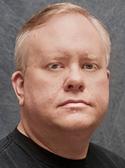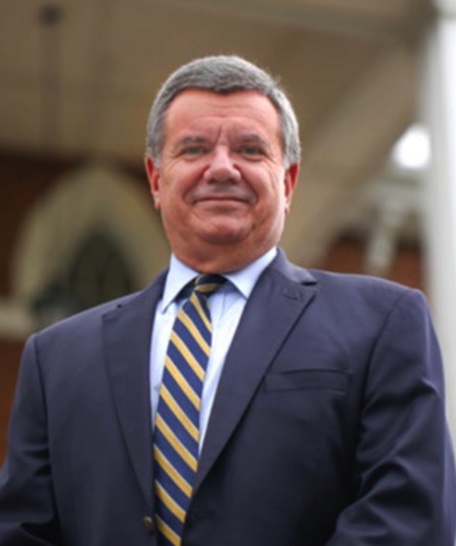GREATHOUSE AND WILSON RECEIVE GRANT TO PURSUE RESEARCH
Dr. Craig B. Greathouse, associate department head who has been promoted to the rank of full professor, and Dr. Charles H. “Trey” Wilson III, associate professor of political science, will receive the UNG Presidential Semester Scholar Awards for the fall semester of 2015. The award will relieve them of their teaching responsibilities so that Dr. Greathouse can focus on a research project titled “Strategic Culture, Concept, Theory, and Comparison: Examining the Differences Between the United States and the European Union in Terms of the Use of Force” and Dr. Wilson can focus on his topic, which is “Desegregating Differently in the Deep South: How Two Similar Georgia Women’s Colleges Dissimilarly Broke the Color Barrier.”

Dr. Greathouse’s project builds on the topic of strategic culture which he began researching in 2007‑2008 with a focus on the United States and the European Union as a security actor. However, it will not be directed only towards looking at strategic culture; it aims to more fully integrate the concept into the neoclassical realist school of thought.
The focus of this project is to address deficiencies in the field of international relations and security studies. Strategic culture has been limited in part because it lacks a clear connection to theory in the field. There have been attempts to link the concept to both constructivism and neoclassical realism. By positioning strategic culture more effectively within neoclassical realism, a researcher can use the concept more effectively. This project builds on and extends the work of scholars like Colin Gray and Alistair Johnston, who form the major fault line in how the concept is used by many in the field. Both view the concept as essential to understanding the strategic choices of states in the system but disagree about how to effectively position the concept. Jeffrey Lantis, Christoph Meyer, and Jeremy Black look at the concept’s usefulness within theory and its usage as a guiding element within security studies. The project directly confronts Lantis and Meyer who argue that strategic culture falls within the constructivist school of thought. The argument that Dr. Greathouse will use is that strategic culture links effectively with neoclassical realism which incorporates domestic and international influences on state decision making. By looking at strategic culture in the manner that Dr. Greathouse plans, this project develops its essential role within the theoretical debate.
Strategic culture (or way of war as used by historians) of specific actors has the capacity to fill an important gap for the disciplines of strategic studies, international relations, foreign policy, and possibly history about how states and other actors within the system make decisions about the use of force. Use of force decisions include when to use force in a specific situation and, secondly, how force will be used. These twin elements about the use of force are important for the discipline and have significant policy ramifications. One of the primary areas of investigation in strategic studies revolves around how and why wars start and how they are conducted. Strategic culture is an important component of that debate. Significant debate is occurring over when and how states, terror groups, and other entities, like the EU, within the system have chosen to use force. While the strategic culture debate is theoretical in nature, its impacts in the real world are keenly felt
Dr. Greathouse’s goal for this project is to address, using a comparison of various actors’ strategic cultures, differences in policy choices and the possible impact in the system. An actor’s strategic culture is the lens which limits the policy options available. Strategic culture defines the boundaries in which actors will consider the use of force and how it is applied within the system. By first developing significant case studies on the current state of U.S. and EU foreign affairs and then through comparison, one may draw conclusions about what impact these various approaches may have going forward. Comparing actions of the United States and EU about Libya in 2011, when both looked at the option of using military force, shows the impact of varying strategic cultures. The policy repercussions of the EU’s inability to use force due to its strategic culture has a tangible impact on the system. By showing policy outcomes which are influenced by strategic culture, this project hopes to expand on the policy tools that are already in place to increase their accuracy. The comparison will be further elaborated given U. S. and EU policy decisions related to Ukraine as well as the Middle East.

Dr. Wilson will compare the decisions of two women’s colleges in Georgia to admit black students. Agnes Scott College in Atlanta was the first women’s college in the Deep South to desegregate when it admitted black students in 1965. Brenau College (now known as Brenau University) in Gainesville was the last women’s college anywhere in the United States to desegregate when it admitted black students in 1972.
This research project can be regarded as Phase 2 of Dr. Wilson’s examination of women’s colleges. Phase 1 involved his dissertation for his Ph.D. degree in history at the University of Georgia, which he earned in 2008. The dissertation’s title was Refining a Woman’s College: Toward a History of Brenau University, 1878‑2008. After he revised the dissertation, the Teneo Press published Dr. Wilson’s manuscript last December with the title, The History of Brenau University, 1878‑2013: A Study of Student, Faculty, and Staff Negotiation to Shape the Collegiate Experience.
Dr. Wilson plans to spend much of his time during the fall to exploring the contents of the archives of the two universities. He hopes to produce a complete draft of a manuscript during the spring of 2016 and to circulate the draft to publishers so that his second published monograph may result.
Dr. Greathouse explained that, when faculty members have engaged in intensive research and they return to the classroom, the experience will have expanded their information about a subject within the field and they will be able to bring that insight back to their class presentations. Second, a sabbatical of this kind can help faculty members recharge their batteries and come back to the classroom more energized.


